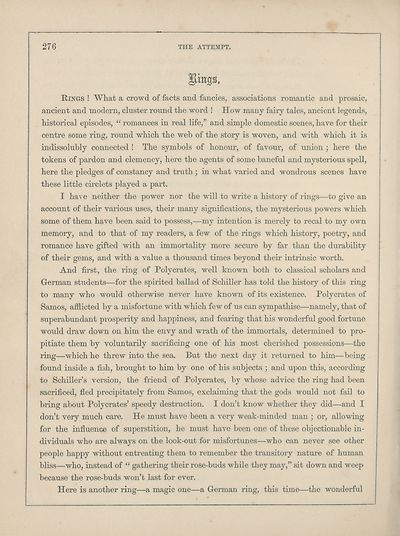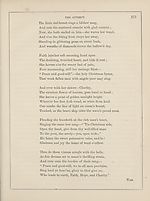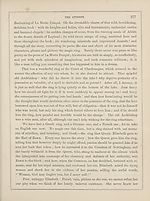Download files
Complete book:
Individual page:
Thumbnail gallery: Grid view | List view

276 THE ATTEMPT.
'gmp.
Rings ! What a crowd of facts and fancies, associations romantic and prosaic,
ancient and modern, cluster round the word ! How many fairy tales, ancient legends,
historical episodes, " romances in real life," and simple domestic scenes, have for their
centre some ring, round which the web of the story is woven, and with which it is
indissolubly connected ! The symbols of honour, of favour, of union ; here the
tokens of pardon and clemency, here the agents of some baneful and mysterious spell,
here the pledges of constancy and truth ; in what varied and wondrous scenes have
these little circlets played a part.
I haA e neither the power nor the will to write a history of rings—to give an
account of their various uses, their many significations, the mysterious powers which
some of them have been said to possess,—my intention is merely to recal to my own
memory, and to that of my readers, a few of the rings which history, poetry, and
romance have gifted with an immortality more secure by far than the durability
of their gems, and with a value a thousand times beyond their intrinsic worth.
And first, the ring of Polycrates, well known both to classical scholars and
German students—for the spirited ballad of Schiller has told the history of this ring
to many who would otherwise never have known of its existence. Polycrates of
Samos, afflicted by a misfortune with which few of us can sympathise—namely, that of
superabundant prosperity and happiness, and fearing that his wonderful good fortune
would draw down on him the envy and wrath of the immortals, determined to pro¬
pitiate them by voluntarily sacrificing one of his most cherished possessions—the
ring—which he threw into the sea. But the next day it returned to him—being
found inside a fish, brought to him by one of his subjects ; and upon this, according
to Schiller's version, the friend of Polycrates, by whose advice the ring had been
sacrificed, fled precipitately fi-om Samos, exclaiming that the gods would not fail to
bring about Polycrates' speedy destruction. I don't know whether they did—and I
don't very much care. He must have been a very weak-minded man ; or, allowing
for the influence of superstition, he must have been one of these objectionable in¬
dividuals who are always on the look-out for misfortunes—who can never see other
people happy without entreating them to remember the transitory nature of human
bliss—who, instead of " gathering their rose-buds while they may," sit down and weep
because the rose-buds won't last for ever.
Here is another ring—a magic one—a German ring, this time—the wonderful
'gmp.
Rings ! What a crowd of facts and fancies, associations romantic and prosaic,
ancient and modern, cluster round the word ! How many fairy tales, ancient legends,
historical episodes, " romances in real life," and simple domestic scenes, have for their
centre some ring, round which the web of the story is woven, and with which it is
indissolubly connected ! The symbols of honour, of favour, of union ; here the
tokens of pardon and clemency, here the agents of some baneful and mysterious spell,
here the pledges of constancy and truth ; in what varied and wondrous scenes have
these little circlets played a part.
I haA e neither the power nor the will to write a history of rings—to give an
account of their various uses, their many significations, the mysterious powers which
some of them have been said to possess,—my intention is merely to recal to my own
memory, and to that of my readers, a few of the rings which history, poetry, and
romance have gifted with an immortality more secure by far than the durability
of their gems, and with a value a thousand times beyond their intrinsic worth.
And first, the ring of Polycrates, well known both to classical scholars and
German students—for the spirited ballad of Schiller has told the history of this ring
to many who would otherwise never have known of its existence. Polycrates of
Samos, afflicted by a misfortune with which few of us can sympathise—namely, that of
superabundant prosperity and happiness, and fearing that his wonderful good fortune
would draw down on him the envy and wrath of the immortals, determined to pro¬
pitiate them by voluntarily sacrificing one of his most cherished possessions—the
ring—which he threw into the sea. But the next day it returned to him—being
found inside a fish, brought to him by one of his subjects ; and upon this, according
to Schiller's version, the friend of Polycrates, by whose advice the ring had been
sacrificed, fled precipitately fi-om Samos, exclaiming that the gods would not fail to
bring about Polycrates' speedy destruction. I don't know whether they did—and I
don't very much care. He must have been a very weak-minded man ; or, allowing
for the influence of superstition, he must have been one of these objectionable in¬
dividuals who are always on the look-out for misfortunes—who can never see other
people happy without entreating them to remember the transitory nature of human
bliss—who, instead of " gathering their rose-buds while they may," sit down and weep
because the rose-buds won't last for ever.
Here is another ring—a magic one—a German ring, this time—the wonderful
Set display mode to: Large image | Transcription
Images and transcriptions on this page, including medium image downloads, may be used under the Creative Commons Attribution 4.0 International Licence unless otherwise stated. ![]()
| Ladies' Edinburgh Debating Society publications > Attempt > Volume 3 > (290) Page 276 |
|---|
| Permanent URL | https://digital.nls.uk/104346712 |
|---|
| Attribution and copyright: |
|
|---|

